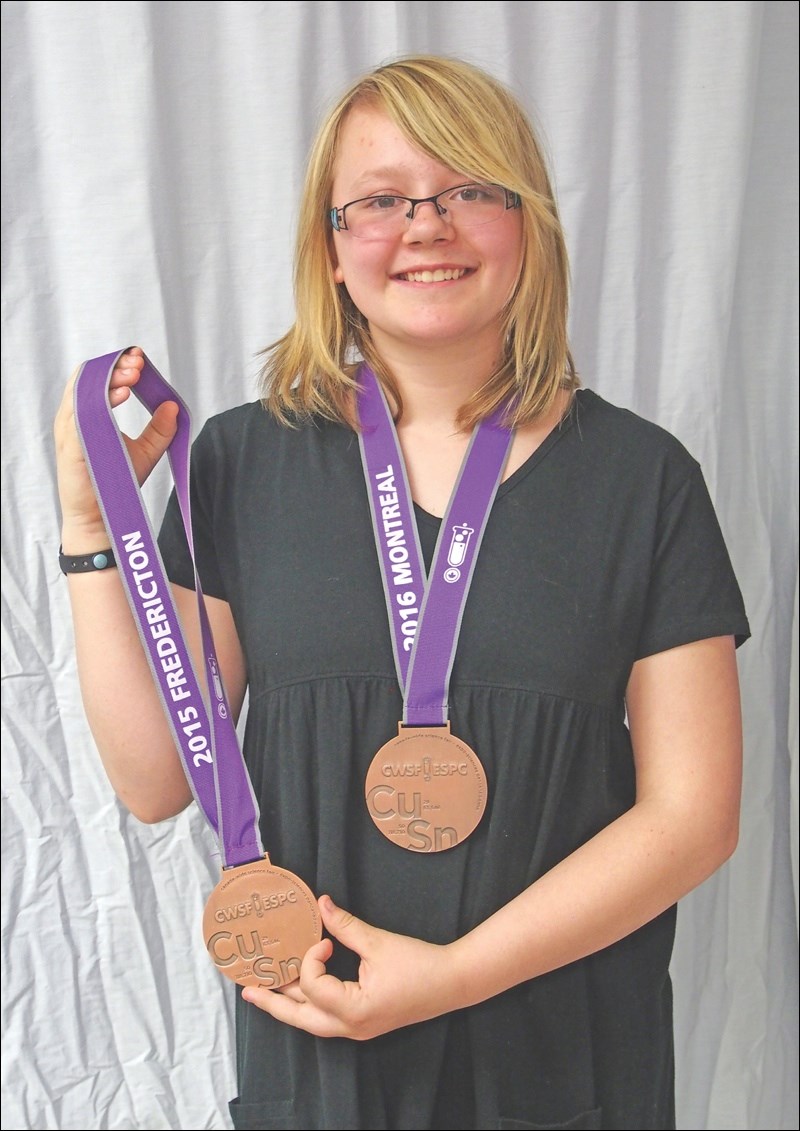If you close your eyes while listening to Chloe Reitlo speak about her scientific research, you might think you are in the presence of a university-level chemistry student.
At 13, Chloe has an inquisitive mind, an impressive vocabulary and two national science medals under her belt.
In May, the grade 8 École McIsaac School student earned a bronze medal at the Canada-Wide Science Fair (CWSF) in Montreal.
Chloe also earned a bronze medal at last year’s CWSF, for her research comparing Flin Flon wastewater to tap water.
Her research for this year’s project hit close to home: she explored a strategy for removing heavy metals, a type of pollutant, from the water supply.
“In Ross Creek they just got the heavy metal testing back this fall saying that they failed the metals test for aquatic life,” Chloe said. “I wanted to find a way so that we can clean water like that, because Ross Creek goes into Schist Lake and so does some of the dump water, into the same water system. Down the lake is Athapap [Lake Athapapuskow]. In Athapap, people drink the water… I wanted to clean the water up a bit.”
Heavy metals like cadmium, mercury, lead, arsenic, iron and zinc are found naturally in the earth, but can become concentrated in water systems to toxic levels as a result of waste from industrial activities. Long-term exposure to toxic levels of heavy metals can have serious health effects on humans, an issue that concerned the budding scientist.
Using samples collected from a well at the Flin Flon waste disposal grounds, Chloe experimented with using different coagulants, or chemicals, to remove heavy metals from water.
Her results were encouraging.
“I found the coagulants were effective,” she said. “One took out 79.9 per cent and 79.66 per cent [of heavy metals] on average.”
According to Chloe’s tests, the water that had been treated with coagulants met most Manitoba regulations, except for one area: the iron content was still too high.
Chloe said her results sparked ideas for future research, including experimenting with heavy-metal coagulants and looking for locally sourced organic coagulants.
She said she plans to give her results to the city, and hopes that the community will respond to the issue of heavy metals in local waterways.
“I’m hoping they will take these results and find a way to treat the problem at its source,” she said. “We can find a way to clean the water when it goes into the lake and clean Ross Creek, then the water, when it goes into that water system, won’t affect it, and hopefully we can reduce some of the damage that has already been done.”
Chloe comes by her interest in water quality honestly: her father, James Reitlo, manages the wastewater treatment plant in Flin Flon.
“Whatever he’s done, I’ve always been curious about the field he went into,” Chloe said of her father. “When I was growing up, he used to work at the airport and I used to be interested in clouds and weather and everything.”
As for the national science fair, Chloe said competing against students from across the country was a bit intimidating. She said she was both daunted and inspired by other projects, like an experiment into using a type of mushroom as fuel, and an alarm for cars that alerts passersby when there is a person or animal at risk of being overheated in the vehicle.
“For me it was very stressful, but once you’re there and talking to people who are in your same situation, it kind of gets better,” she said.
This year, Chloe had another reason to keep calm: she was travelling with fellow Flin Flon student Madison McIntyre, who also qualified for the CWSF for her project onHIV/AIDS knowledge, attitudes and behaviour.
Although Chloe and Madison attend different schools – École McIsaac School and Ruth Betts Community School, respectively – Chloe said the two supported and encouraged each other in the months leading up to the national fair.
As Chloe looks to the future, she hopes to keep up her interest in science. If she can manage the additional work when she enters high school next year, she may enter the regional science fair in the hopes of qualifying for CWSF again.
Looking further into the future, she has considered careers in medicine and forensics. For now, though, one thing is certain: this young woman is sure to make an impact – starting, perhaps, with northern Manitoba waterways.




